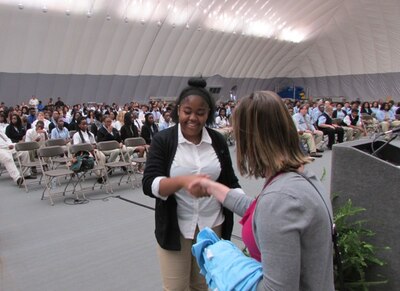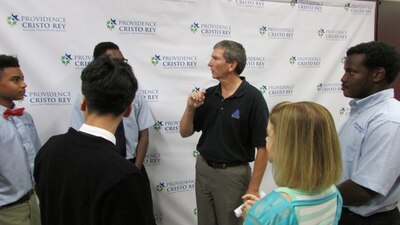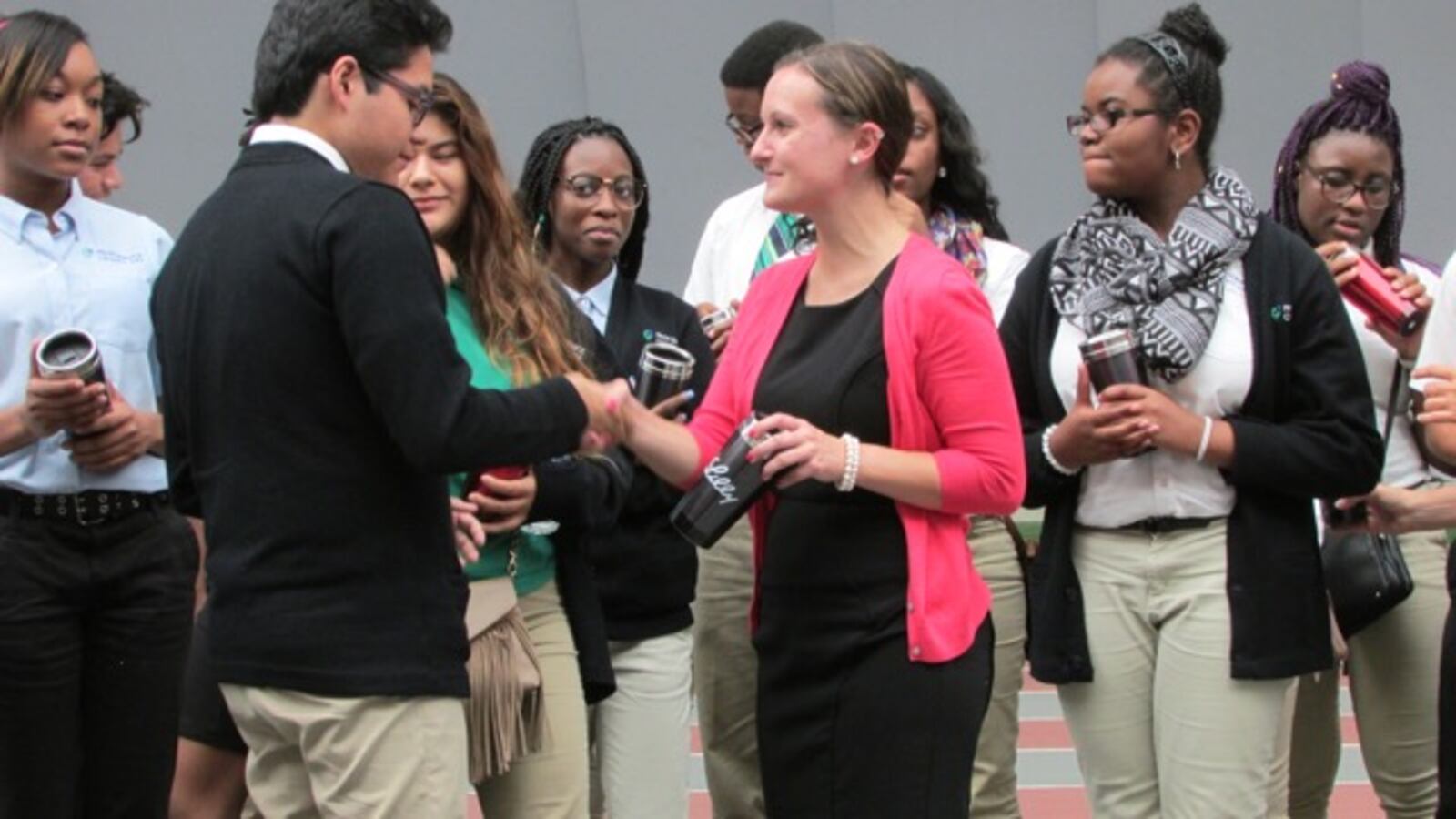When it was Gordon Hall’s turn to announce his company’s “draft picks” — four students from Providence Cristo Rey High School who will spend the school year working at the Carmel marketing company — he could barely contain his enthusiasm.
The Allied Solutions executive shouted their names into the microphone:
“Paul Ellery! Zachary Allen! Joaloi Morales! Dasani Daniels-Morton!”
The four young men followed Hall out of the main room of the cavernous, domed athletic center at the University of Indianapolis to a side room for a group photo and a pep talk. After introductions, he sorted out which student would work which days of the week and explained how they would ride a bus to Carmel for work.
Just then, Daniels-Morton, a Cristo Rey freshman, raised his hand with a question: “Uh, what exactly do you do?”
Hall smiled. Perhaps he had put the cart a bit before the horse.
“That’s a great question!” he said with laugh. “We supervise the mail room. You will do a variety of tasks. You receive mail, you sort mail, you stock supply stations, you log UPS packages coming in. … You’ll be up and about most of the day.”

Other schools hold splashy events to promote students’ college choices, but Cristo Rey uses “Draft Day” as a way to generate excitement about the school’s unique core feature: its work-study program. The Catholic high school, which is beginning its 10th school year, is part of a Chicago-based network of 32 schools across the country aimed at helping poor children go to college.
The work-study program aims to give students experience in the workplace, help them develop good habits like arriving on time and completing assignments thoroughly, and allow them to see different kinds of jobs up close to start to gauge career options.
The program is also essential to keeping the school’s $13,300 tuition in reach for the families it serves. Almost all of the 255 students come from from families poor enough to qualify for free or reduced-price lunch, and payments from the companies who employ work-study students bring each family’s price tag down to an average of just $200. Many students also use state-funded tuition vouchers to pay part of the cost of attending the school.
Since the first graduating class in 2010, all of Cristo Rey’s 147 graduates have been accepted to college.
This year, nearly 100 Indianapolis-area companies will employ at least one Cristo Rey work-study student. Students select companies that interest them and interview. Then the companies and students each list their favorites. The school then matches students with the companies where there is mutual interest or where they see a likely good fit.
Then the matches are announced at an event modeled after the NFL draft. There aren’t many fancy suits, but some students do dress up — many of the boys wore bowties with their buttoned-down blue school uniform shirts — and wait anxiously as the companies take their turns at the microphone and call out their “picks.”
As each student’s name was called, their classmates cheered and they came to the podium for handshakes and, in many cases, gifts of T-shirts or other corporate logo items.
The tension grew as students waited to hear their names.

For example Ellery, a senior, had worked at Allied Solutions last year and was open to either returning or working somewhere new.
“I thought maybe I would be doing something different but then, boom, my name was called,” he said.
Allen, a junior, also has been through this before. Last year, he worked at Crew Car Wash. He was happy to be picked by Allied.
“I heard a lot of great things about them,” he said. “I think it will be a great experience.”
Once in a while, when students turn out to fit in well at the company, the internships have lead to jobs after high school or college. But most of the time, the internships simply offer training and guidance.
The employers sometimes get as much out of it as the students.
Jon Loftin, the president of MJ Insurance, was on the school’s board of directors but was initially hesitant to have his company participate in the work-study program. He was worried that insurance wouldn’t be exciting enough to high school students.
But Joe Heidt, the school’s president, persuaded him to give it a shot.
“What I totally underestimated was the impact it had on me, my family and the other 140 associates who work along side me,” Loftin said.
That first year, Loftin noticed one of the Cristo Rey students was especially shy. He was very polite, Loftin said, but answered questions with a simple “yes, sir” or “no, sir” and seemed nervous when speaking to the company president. Loftin said understood how that could feel intimidating, so he didn’t push the student to interact with him.
That changed when Loftin’s family was struck by misfortune. His niece was seriously injured in a gymnastics accident. Loftin said his coworkers flooded him with support, but he was most moved by a handwritten letter that showed up in his mailbox about a week after the accident bearing the company’s return address.
“I remember thinking, ‘Who would send me a letter?’” Loftin said.
It was from the shy work-study student.
“I heard what happened to your niece,” it read. “Know that she will make it and that I am praying for you. God bless.”
Loftin was stunned. “I knew he would rather talk to anyone but me,” he said. “But he knew I was going through family tragedy and found the courage in him to send me that letter.”
Loftin told the story to Cristo Rey students just before the draft began.
“You inspire us more than we inspire you,” he said. “Why? We observe your courage, your grit, your willingness to overcome extreme adversity and your passion for a better life and to impact the people around you.”

